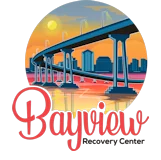Opioid Treatment Center for Addiction in California
Opioid Treatment Center for Addiction in California
At Bayview Recovery Center in San Diego, California, we are dedicated to assisting individuals who are grappling with addiction. Our specialized detox and treatment programs are tailored to meet the unique needs of each patient, addressing the complexities of substance use disorder as developed by our team of skilled medical professionals.
Through the acquisition of healthy coping mechanisms and active engagement, our comprehensive opioid addiction treatment center helps clients establish a solid groundwork that paves the way for sustained recovery.
What are Opioids?
Opioids are a class of drugs with addictive components that can be naturally found in the opium poppy plant. This class also includes synthetic and semi-synthetic chemicals that interact with the brain’s opioid receptors, leading to various effects on the brain. Prescription opioids are often used to provide pain relief and other beneficial effects by blocking pain signals between the body and the brain. Individuals suffering from chronic, mild, or severe pain may be prescribed opioid pain medications.
While prescription painkillers are legal and generally safe when used as directed, some individuals may face issues such as misuse, dependence, or addiction. Some individuals may turn to intravenous heroin (or other illicit drugs) when their prescription runs out but they continue to crave opioids. The use of opioid drugs may result in feelings of relaxation or euphoria, although many people continue to use opioids because their pain has not been resolved. In such cases, professional
Opioids vs. Opiates: What's the Difference?
Opioids can be categorized as natural, synthetic, or semi-synthetic. The term “opiates” specifically refers to natural opioid substances that are not manufactured, such as those that occur naturally in the poppy plant. All opiates fall under the category of opioids, but not all opioids are opiates.
Signs and Symptoms of Opioid Abuse
- Skin feeling itchy
- Exceeding the prescribed amount of opioids
- Impulsivity
- Loss of interest in previously enjoyable pastimes
- Withdrawal from social interactions
- Abrupt changes in behavior (e.g. mood swings, irritability, unusual happiness)
- Using prescription opioids intended for acquaintances or family members
- Obtaining prescription opioids from multiple doctors, engaging in “doctor shopping”
- Participation in risky activities, such as driving while under the influence of opioids
- Difficulty in remaining awake and alterations in sleep patterns
- Track marks resulting from intravenous drug use on the arms, between toes, or other areas
- Dishonesty regarding substance abuse issues
- Unexplained weight reduction
- Pinpoint pupils
Opioid Withdrawal Symptoms
- Anxiety
- Nausea and vomiting
- Muscle aches
- Excessive yawning
- Stomach cramps and other digestive issues
- Dilated pupils
- Goosebumps
- Runny nose
- Irritability
Treatment Options for Opioid Dependence
There are various treatment programs available to help individuals struggling with opioid abuse and other types of drugs. These programs include:
- Inpatient treatment programs
- Outpatient treatment
- Partial hospitalization program (PHP)
- Intensive outpatient program (IOP)
- Medication-assisted treatment
- Structured sober living
- Aftercare program
For individuals with opioid use disorder, the rehab process often begins with a medical detox and is supported by a medication-assisted treatment (MAT) program. From there, the individual usually moves on to an opioid addiction treatment program.
When deciding between outpatient rehab and inpatient rehab, it is important to consider the advantages of each option. Inpatient rehab allows individuals to reside at the treatment center for the duration of their program. Inpatient treatment can be particularly beneficial for those with severe opioid addiction, or those who have experienced an overdose in the past. The focused approach to treatment allows for patients to receive more focused care and be held accountable for their current sobriety and long term recovery alike.
On the opposite side of the spectrum, outpatient rehab allows patients to receive treatment during the day and return home (or to a sober living environment). Outpatient rehab may be more suitable for individuals who have completed residential treatment, who have a less severe addiction, or who feel they cannot step away from life obligations. The choice between outpatient and inpatient rehab should be based on an individual’s unique circumstances and treatment needs.
Addiction Therapy Services for Opioid Use Disorder Treatment

Behavioral therapy plays a crucial role in the treatment of opioid addiction across treatment programs. Therapy options available for substance abuse treatment programs include:
- Individual therapy
- Group therapy
- Family therapy
- Cognitive-behavioral therapy (CBT)
- Dialectical behavior therapy (DBT)
Each of these therapy options can be part of a comprehensive approach to treating substance use disorder, addressing the root causes and helping them with building a new life of sobriety. Addiction therapy services provide individuals with the opportunity to talk with professionals with a deep understanding of addiction and the challenges that come with the disease. Group therapy allows individuals to share their experiences and successes with others undergoing the same process, which can be enlightening and motivating.
The Value of Gender-Specific Treatment For Addiction
For some people, a single-gender recovery program provides an extra kind of support that helps them achieve a successful recovery. They may find it easier to discuss the underlying causes of their addiction around people of the same gender. People of the same gender may have more similar life experiences, and thus may have knowledgeable people with whom to discuss coping mechanisms. If a person has suffered trauma at the hands of someone of the opposite gender, they may feel more comfortable opening up at a treatment center designed only for people with their specific needs.
At Bayview Recovery, we offer specialized treatment that speaks to the needs of men. Personalized care and unwavering support from fellow men can help individuals build the skills to facilitate long term sobriety. The affirmation and friendships that can result can go a long way in helping individuals regain control of their addictions and lives.
Dual Diagnosis Treatment for Opioid Rehab
- Depression
- Bipolar disorder
- Anxiety disorders
- Post-traumatic stress disorder (PTSD)
- Attention-deficit hyperactivity disorder (ADHD)
Receive Opioid Addiction Treatment at Bayview Recovery Center
Bayview Recovery Center assists with various substance use disorders, such as opioid and opiate addiction. Our extensive experience in treating substance use disorder and facilitating long-term healing for clients spans over several years. Our comprehensive range of treatments and programs encompasses:- Professional assessment
- Mental health services
- Extended care (including our 90-day program)
- Dual diagnosis treatment

Alyssa is a licensed Clinical Social Worker and received her Master’s degree from San Diego State University. She has experience working with individuals in recovery of all ages for over eight years. Alyssa has also worked with at-risk homeless foster youth transitioning into independent living along with the families in the neonatal intensive care unit at UCSD.
